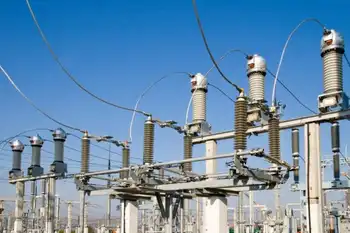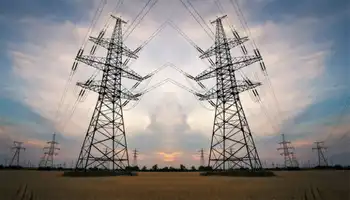IBM partners with industry to set efficiency agenda
By Electricity Forum
CSA Z462 Arc Flash Training - Electrical Safety Essentials
Our customized live online or in‑person group training can be delivered to your staff at your location.

- Live Online
- 6 hours Instructor-led
- Group Training Available
IBM is seeking to engage public sector utility companies to tackle significant corporate energy efficiency issues by jointly developing awareness on current levels of data center and facilities energy consumption and creating plans to reduce, monitor, verify and benefit from reducing energy consumption. IBM is also announcing a new carbon assessment service and a new virtual green data center.
IBM, in partnership with utility industry leaders, plans to develop new energy demand management programs aimed at helping business of all sizes reduce energy consumption across the complete data center and facilities landscape. Major elements include educating IT departments on energy consumption, targeting specific projects that offer immediate energy reduction, helping customers monitor and verify progress, and applying for incentives that reward energy reduction.
IBM is working with leaders in the utility industry to reward businesses for reducing energy through the use of Energy Efficiency Certificates (EECs). These certificates from energy efficiency projects — a first of kind program with results verified Neuwing Energy Ventures — an independent third party — are an easy way to verify that the amount of electrical energy savings resulting from specific energy efficiency projects is real and permanent.
New today is the expansion of the program across the entire data center and facilities landscape. Customers earn certificates for the total energy demand reductions attributable to a project based on total megawatt hours saved through a certified Measurement and Verification (M&V) plan of energy reductions, an emerging business metric for corporate sustainability, which creates a true measurement of energy reduction. The end goal being the joint promotion of efficient use of electricity that results in reduced emissions of green house gases and other pollutants — these verified results lead to real environmental protection.
In addition to traditional data center projects, is the new ability to verify projects and earn certificates for reducing energy consumption beyond the data center including facilities components such as office lighting systems, cooling requirements, monitors and printers. Going forward generating the data required to validate energy reductions is being made simpler with the planned integration of automated reporting with IBM Tivoli Green Management.
Consolidated Edison — with more than 3 million customers in New York City and Westchester County, New York — is a pilot member of this initiative working with IBM around energy consumption awareness, co marketing and demand management with a focus on customer measuring and verifying energy reduction through Energy Efficiency Certificates.
"ConEdison wants to encourage reducing energy consumption in the marketplace enabled by new technologies and best practices," said Rebecca Craft, Director of Energy Efficiency Programs, ConEdison. “We are pleased to partner with IBM through their Project Big Green initiative to raise awareness and encourage and motivate client implementation. The ability to accurately monitor and verify the efficiencies gained is especially important as environmental regulations emerge which could have a significant effect on our large and small data center customers. Energy Efficiency Certificates, certified by companies like Neuwing Energy, are a positive initial step to the measurement of complex projects verification of results."
An additional focus area of this initiative is to support the goal of the U.S. Environmental Protection Agency for common initiatives to promote energy efficiency gains in data centers. “Realizing these efficiency gains will take coordination and collaboration among many stakeholders, the government, the IT industry, data center operators, electric utilities and others," according to a recent report.
Melbourne IT, a leading global IT services company that operates over 2,000 servers on a daily basis, is looking forward to the benefits of Energy Efficiency Certificates.
"We welcome the expansion of IBM’s Energy Efficiency Certificate program,” said Theo Hnarakis, CEO & Managing Director of Melbourne IT. "Energy efficiency is good for the environment and a key business requirement for us. We recently deployed double the number of new IBM servers for the same amount of power usage and heat signature as previous servers. Energy Efficiency Certificates will help us to officially validate and document our results as part of our Sustainability Strategy."
IBM also sees Energy Efficiency Certificates as a means to satisfy government utility regulator requirements to manage a percentage of electricity demand growth through energy efficiency.
“The initial launch of Project Big Green demonstrated that clients can achieve significant business results from completing energy efficiency projects while addressing urgent operational issues,” said Rich Lechner, vice president, Enterprise Systems, IBM. “Over the past year, we’ve found that a one dollar savings in energy costs drives an additional six to eight dollars in operational savings. More and more, clients are committing to ‘green agendas’ and are looking for ways document progress toward the commitment they are making.”
IBM is also announcing a new service to help clients, just starting their green transformation, to identify the most rapid areas of reduction in IT carbon emission across the infrastructure, including both the data center and the distributed environment including offices, retail stores, warehouses, etc.
While early momentum has clearly been in the greening of data centers, studies are starting to reveal that in fact there is at least as much emission reduction potential in the distributed environment – in some cases 50 percent or more. As few companies have existing infrastructure that has been built with energy efficiency as part of the design criteria, the IT Carbon Strategy Study provides clients specific recommendations on project priorities with the biggest potential gains. Projects could comprise the network, printers, distributed servers (server closets outside the data center), facilities upgrade (HVAC, UPS, etc) and desktop computers and monitors.
A typical 3-4 week study includes a kick off workshop to agree on overall objectives and targets, data gathering and data analysis leveraging a carbon impact analysis tool to help assess cost benefit analysis. After completing an action oriented workshop, clients are presented with the results in a report including the specific findings and recommendations. One example of a client that has benefited by early versions of this assessment includes a large UK retailer. Based on the study it re-engineered its end-of-day batch processing system and expects to save 1.68 million kilowatt hours of electricity which means an estimated £120,000 and cutting CO2 emissions by an estimated 1306 metric tons.
IBM is also announcing a three dimensional Virtual Green Data Center that allows visitors to learn how to manage and improve their data center energy efficiency. It will demonstrate IBMÂ’s leading green data center technologies covering energy efficiency, virtualization, and resiliency.
As energy costs continue to rise and additional expense control pressures are applied Web 2.0 technologies, like the virtual green data center become increasingly important as a means to increase productivity and control costs. For example, using similar Web 2.0 technologies IBM is able to save $97 million per year in travel costs.
Available on the Green Data Center on the IBM Island in Second Life and staffed 24 hours a day with multi lingual avatars, this new Virtual Green Data Center provides a realistic and immersive experience of IBM’s Roadmap to a Green Data Center. It offers easy access to “inside workings” of a data center in ways not readily duplicated in real life data center visits. It also creates an immersive experience that simplifies the understanding of complex concepts and processes and provides a public, open environment for self-guided tours, individual, or group tours with a trained staff guide.
The Center is available for on demand education and client briefings with sales team with no travel requirements.
Since it was originally announced last Spring, IBMÂ’s Project Big Green initiative has helped more that 2,000 clients develop greener data centers with average energy saving of more than 40 percent and increased the utilization of systems by an average two to four times. Additionally, IBM has recycled more than 1.5 billion pounds of IT equipment since 1996. Also, since from 1990 to 2007 IBM has avoided energy-use-CO2 emissions equivalent to 45 percent of the companies 1990 energy use, saving more than $18 million annually, or more than $310 million in total.
Project Big Green is part of IBM strategy to help clients move to a new enterprise data center by focusing on best practices in virtualization, green IT, service management, security and cloud computing and offers dramatic improvements in IT performance, energy efficiency and helps enable rapid deployment of new IT services to support future business growth.











